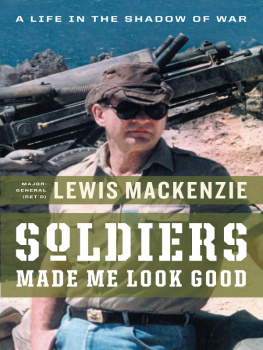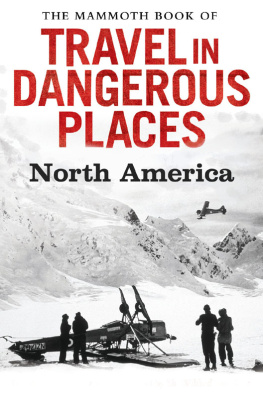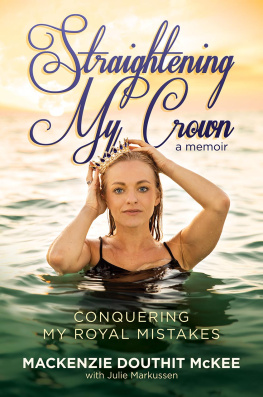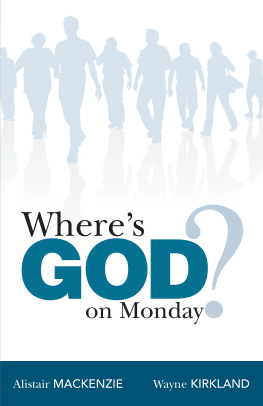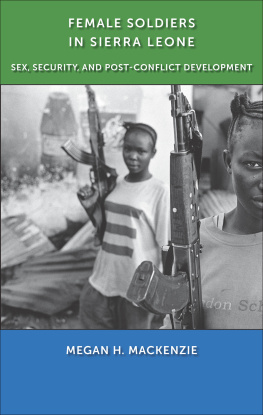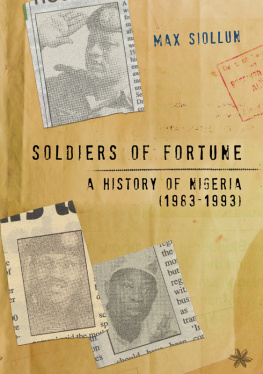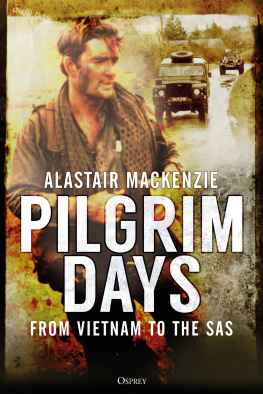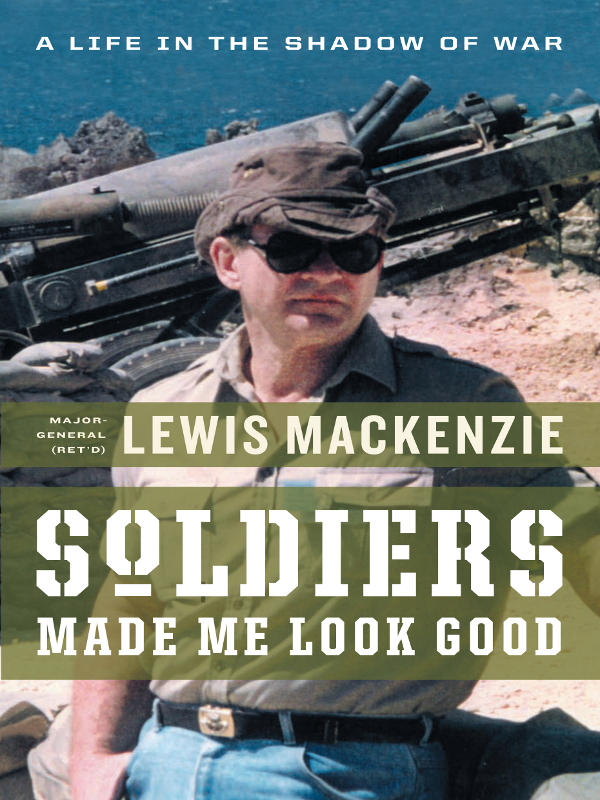
SOLDIERS MADE ME LOOK GOOD

A LIFE IN THE SHADOW OF WAR

MADE ME LOOK GOOD
DOUGLAS & MCINTYRE
VANCOUVER / TORONTO / BERKELEY
Copyright 2008 by Lewis MacKenzie
All rights reserved. No part of this book may be reproduced, stored in a retrieval system or transmitted, in any form or by any means, without the prior written consent of the publisher or a licence from The Canadian Copyright Licensing Agency (Access Copyright). For a copyright licence, visit www.accesscopyright.ca or call toll free to 1-800-893-5777.
Douglas & McIntyre Ltd.
2323 Quebec Street, Suite 201
Vancouver, British Columbia
Canada V5T 4S7
www.douglas-mcintyre.com
Cataloguing data available from Library and Archives Canada
ISBN 978-1-55365-350-9 (cloth)
ISBN 978-1-55365-318-9 (pbk.)
ISBN 978-1-926706-92-4 (ebook)
Editing by John Eerkes-Medrano
Copy editing by Ruth Wilson
Jacket photograph courtesy of Lewis MacKenzie
Uncredited photographs courtesy of the author
We gratefully acknowledge the financial support of the Canada Council for the Arts, the British Columbia Arts Council, the Province of British Columbia through the Book Publishing Tax Credit, and the Government of Canada through the Book Publishing Industry Development Program (BPIDP) for our publishing activities.
THIS BOOK IS DEDICATED to the Canadian soldier of today, a member of a tiny army fighting well above its weight on the international stage and bringing much credit to Canada as the rest of us safely observe from the sidelines.
We were pragmatic to the extreme, and we thought every problem could be solved by an equation or by adjusting the numbers. Not one of us had any education in the humanities even Hitler fancied himself an architect, in spite of his lack of formal training. While serving twenty years behind Spandaus walls I constantly studied the humanities, and Im convinced that if a few of us within Hitlers inner circle were so educated at the time we could have made a positive difference.
ALBERT SPEER, speaking to Canadian students in West Germany, 1976
Contents
IN 1993, THANKS to the curiosity and support of a large number of Canadians, I was fortunate to be the author of a national #1 bestseller entitled Peacekeeper: The Road to Sarajevo. No one was more surprised than I was, and I assumed that writing a book was a one-time experience, sort of a been there done that but dont push your luck type of thing.
What I did not anticipate was the somewhat flattering interest from publishers hoping for a second book. I was leery of the suggestion and kept thinking of Michael J. Foxs disappointing film, Back to the Future, Partii. I had really enjoyed the first Back to the Future but the sequel was a bit of a flop, and I had heard that it was basically a montage of clippings gathered from the editing-room floor after the first movie had been completed. It seems the producers of the sequel assumed they could reap rewards from the positive legacy of the first movie during the distribution of the second. It didnt work, and I was concerned that I might suffer the same experience if I wrote another book. So I resisted the overtures.
We retire from our chosen Profession of Arms pretty young. Lets face it, we dont need some fifty-five-year-old turning around and shouting follow me! to a thousand armed nineteen-to twenty-five-year-olds as they storm the enemy on a hill in some faraway land. I took off my uniform a month before my fifty-third birthday in 1993.
To my considerable surprise, life did not come to a shuddering halt when I turned in my military ID card and ventured out the door and onto civvy street. During the past fifteen years I seem to have been on fast-forward and involved in a significant number of interesting andmost of the timesatisfying experiences. I have written about them all: returning to Somalia; involvement with the release of Canadian hostages in Bosnia; multiple appearances before U.S. Congressional committees and dealing with accusations of rape and murder from the Bosnian prosecutor that followed; heading up a team to restructure the Irish Armed Forces; running in the 1997 federal election; hosting an award-winning documentary on the UN; helping CTV cover NATOs bombing campaign against Serbia from Belgrade; assisting a small Canadian NGO founded by a fellow soldier with its humanitarian work in Africa; commenting on military and foreign affairs, initially for the National Post and later for the Globe and Mail; maintaining my love for (obsession with) motor racing by continuing to race Formula Fords and anything else Im offered and, along the way, speaking to well over a million people in eight countries on the professional speaking circuit.
Two chapters of this book are dedicated to what will probably be controversial subjects. One deals with Carol Offs biased, highly critical and error-ridden personal evaluation of my performance as the UN commander in Sarajevo in 1992. The other chapter analyzes the probable genesis of a serious disagreement between Senator Romo Dallaire and me regarding leadership priorities.
If I wanted to start this book at the beginning, describe how I ended up in the military and then jump to my post-military career, I had a problem. I would have to account for the thirty-three-year-gap, and I couldnt describe the most interesting experiences I had in uniform because I had already done that in Peacekeeper. I thought about various options on and off for the last few years, and Ive come up with what I hope is a satisfactory solution.
Rank progression in the military is frequently inexplicable to those both inside and outside the Profession of Arms. Many factors come into play: some within an individuals control, such as performance, knowledge, fitness and commitment. In many instances, though, other factors are well outside the individuals control: timing, exposure, an articulate boss and the severity of the challenges at work, all of which come under the general heading of Luck! There are many highly talented people in uniform who might have performed to an outstanding level well beyond their current rank, but the absence of luck in their careers has denied them the opportunity. For those of us fortunate enough to benefit from Lady Lucks smile, our success is due in no small part to those talented people who work for us and whowith all their experience and talent, but less luck make us look good. I decided I would cover my military career by describing the events that I thought were the most responsible for the good fortune and satisfaction I experienced in my thirty-three years of commissioned service. Not surprisingly, I emphasize the large role played by luck in each anecdote.
It would be inappropriate to conclude this book without discussing the two subjects that dominate my time at present: Afghanistan and leadership. I feel compelled to write about our sincere efforts to help the Afghan people get their country back to a secure state under their own control. I will offer some comments about how we got there and what we are achieving. My visits to the country have me longing to be back in uniform, but I realize that the current generation of our soldiers has moved on to establish their own enviable reputation as second-to-none. They make us all look good, at home and abroad, in spite of the few critical rants to the contrary. Any of them who pick up this book will be bored to tears reading about the experiences of a one-time Cold War soldier, considering what they have experienced on the postCold War battlefield.
Next page
